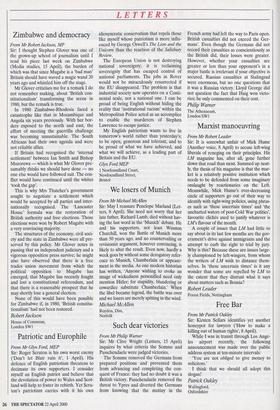LETTERS Zimbabwe and democracy
From Mr Robert Jackson, MP Sir: I thought Stephen Glover was one of the grown-up school of journalism until I read his piece last week on Zimbabwe (Media studies, 15 April), the burden of which was that since Mugabe is a tad man' Britain should have waved a magic wand 20 years ago and whistled him off the stage.
Mr Glover criticises me for a remark I do not remember making, about 'British con- stitutionalism' transforming the scene in 1980, but the remark is true.
In 1980 Zimbabwe-Rhodesia faced a catastrophe like that in Mozambique and Angola six years previously. With her bor- ders exposed to the north and east, the effort of meeting the guerrilla challenge was becoming unsustainable. The South Africans had their own agenda and were not reliable allies.
If Britain had recognised the 'internal settlement' between Ian Smith and Bishop Muzorewa — which is what Mr Glover pre- sumably thinks we should have done — no one else would have followed suit. The con- flict would have continued until the whites `took the gap'.
This is why Mrs Thatcher's government sought to negotiate a settlement which would be accepted by all parties and inter- nationally recognised. The 'Lancaster House' formula was the restoration of British authority and free elections. Those elections were won by Robert Mugabe with a very convincing majority.
The structures of the economy, civil soci- ety and the state in Zimbabwe were all pre- served by this policy. Mr Glover notes in passing that an independent judiciary and a vigorous opposition press survive; he might also have observed that there is a free trades union movement from which the political opposition to Mugabe has emerged, that Mugabe has recently fought and lost a constitutional referendum, and that there is a reasonable prospect that he may shortly lose a general election.
None of this would have been possible for Zimbabwe if, in 1980, 'British constitu- tionalism' had not been restored.
Robert Jackson
House of Commons, London SW1


























































 Previous page
Previous page